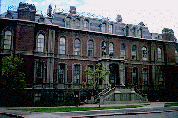 School of Information
School of Information
(Previously School of Library & Information Studies)
Michael Buckland
Herbert Haviland Field, 1868-1921:
Concilium Bibliographicum Founder
*New* 赫伯特·哈维兰·菲尔德 (Herbert Haviland Field), 1868-1921: 书目委员会 (Concilium Bibliographicum)创始人.
Chinese translation by Hongjin Yan of Home Easy-Decor, Oct 2024.
Herbert Haviland
Field, 1868.-1921: Osnivač Concilium Bibliographicum (Vijeće
bibliographicum), Croatian translation by Milica Novak, Apr 2021.
Herbert
Haviland Field, 1868-1921: Neuvoston perustaja bibliographi, Finnish
translation by Elsa Jansson, Nov 2020.
Herbert Haviland
Field, 1868-1921: Concilium Bibliographicum alapítója, Hungarian
translation by Elana Pavlet.
허버트 하빌랜드
필드(Herbert Haviland Field), 1868-1921: 콘실리움(Concilium Bibliographium)
설립자, Korean translation by PlayerAuctions, Dec 2022.
Herbert
Haviland Field, 1868-1921: Fundador del Concilium Bibliographum, Spanish
translation by Ibidem Group, Mar 2020.
Herbert Haviland Field founded and operated one of the
largest science information services on the early twentieth century, the
Concilium Bibliographicum. He also undertook intelligence work for
Allen Dulles during the First World War.
Born in Brooklyn on April 25, 1868, the same year
as his rival and collaborator Paul Otlet, Herbert Field was a gifted
zoologist and a Quaker idealist. An early recipient of a Harvard Ph.D
he also received French and German doctoral degrees.
Committed to social idealism and international peace, he
dedicated himself to improving bibliographical access to biological
literature and founded the Concilium Bibliographicum
in Zurich, Switzerland, in 1895, the same year Paul Otlet
and Henri LaFontaine founded the International Institute for
Bibliography in Brussels, Belgium.
Herbert Field married Nina Eschwege, a British
woman of German descent, and they had four children, two of
whom, Noel and Hermann, became famous for their connections with
Communist espionage activity and for being kidnapped by
Soviet intelligence in 1949 and held captive for some five years
as they were used as sources for the bloody purges in the
Soviet bloc.
At the Concilium Bibliographicum, initially
financed from his personal and his family's funds, Field
aimed at completeness of coverage in all languages, precise
classification using the Universal Decimal Classification,
card files, but no abstracts, which were copied and mailed
to subscribers.
Although he was unable to make his service financially
self-sustaining, by the 1903 some 13,000,000 cards had
been sent to over 600 subscribers.
Field died of the influenza on April 04,
1921, in Zurich Switzerland. The Concilium Bibliographicum
continued with great difficulties until it closed in 1940
amid wartime difficulties and both it and Field were almost completely
forgotten.
See also Concilium
Bibliographicum.
Source
The only detailed account is:
Colin B. Burke.
Information
and intrigue: From
index cards to Dewey Decimals to Alger Hiss. MIT Press, 2014.
Additional sources are listed on Colin Burke's website http://userpages.umbc.edu/~burke/
with an extensive bibliography at http://userpages.umbc.edu/~burke/fieldbib716pdf.pdf
- Colin B. Burke and Michael K. Buckland. Herbert Haviland Field
(1868-1921): Bibliographer of Zoology. Bulletin of the Association for
Information Science and Technology 42, no 6 (August/September 2016): 10-14.
pdf
- Michael K. Buckland and Colin B. Burke. Precise Zoological Information:
The Concilium Bibliographicum, 1895-1940. Bulletin of the Association for
Information Science and Technology 42, no 6 (August/September 2016):15- 19.
pdf.
Also Wikipedia: Herbert
Haviland Field and Concilium
Bibliographicum.
Go to
History,
or to Michael Buckland's
Home Page.
 School of Information
School of Information